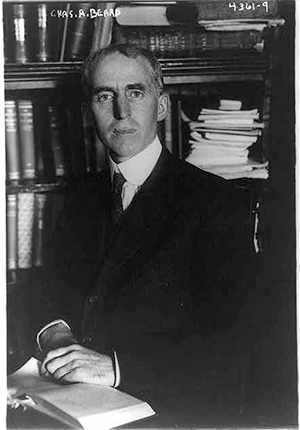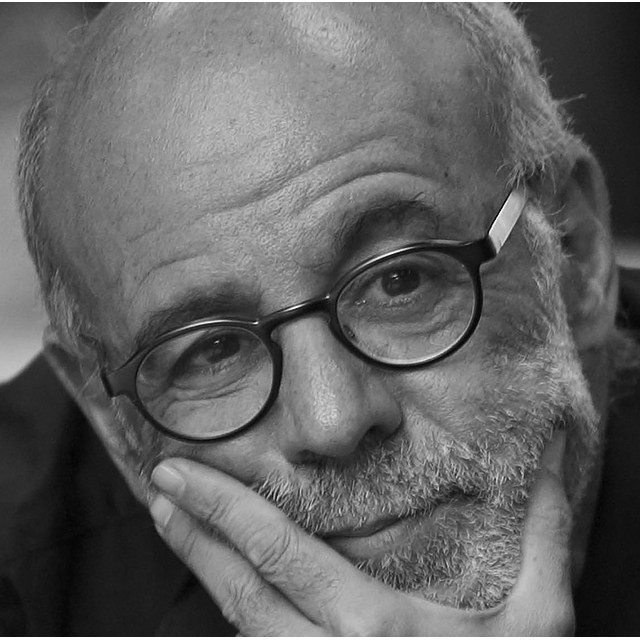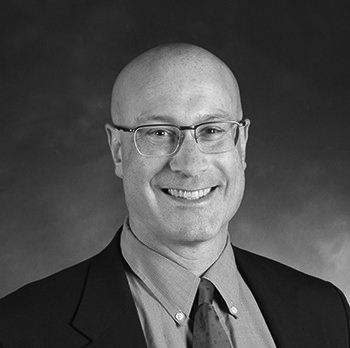Historic Document
An Economic Interpretation of the Constitution of the United States (1913)
Charles A. Beard | 1913

Library of Congress, Prints and Photographs Division
Summary
One of the country’s preeminent historians and political scientists, the Indiana-born Columbia University professor Charles Beard threw down the gauntlet before the idea of the American Founders as chiefly public-spirited in their work, and motivated by the highest of political ideals. Beard’s bombshell book, whose data and interpretations were both praised and challenged, if not denounced, sought to demonstrate that, far from being selfless champions of disinterested ideals, the Founders were largely wealthy and self-interested property owners, whose system of checks and balances was designed to frustrate majority rule to preserve and maintain a hierarchical order protective of economic, political, and social elites. The implication of Beard’s attack on what he deemed to be unwarranted Constitution (and Founder) worship, was that to reclaim political and economic power from property-holding elites, the nation’s common people would need to find new ways of understanding and interpreting the country’s foundational charter that would be more amenable to the hopes and aspirations of a self-directing democratic government.
Selected by

William E. Forbath
Lloyd M. Bentsen Chair in Law, and Associate Dean for Research, The University of Texas at Austin School of Law

Ken I. Kersch
Professor of Political Science, at Boston College
Document Excerpt
Broadly speaking, three schools of interpretation have dominated American historical research and generalization. The first of these, which may be justly associated with the name of Bancroft, explains the larger achievements of our national life by reference to the peculiar moral endowments of a people acting under divine guidance … it sees in the course of our development the working out of a higher will than that of man. There is to be observed in the history of the struggle for the Constitution … “the movement of the divine power which gives unity to the universe, and order and connection to events.”… The second school … which in the order of time followed that of Bancroft, may be called the Teutonic, because it ascribes the wonderful achievements of the English-speaking peoples to the peculiar political genius of the Germanic race…. [This school held that] [t]he full fruition of their political genius was reached in the creation of the Federal Constitution…. The third school of historical research … is marked … by an absence of hypotheses. [It has concerned itself] with critical editions of the documents and with the ‘impartial’ presentation of related facts….
[T]he hypothesis that economic elements are the chief factors in the development of political institutions has … been used in one or two serious works…. [but] it has not been applied to the study of American history at large ….[T]he neglect has been all the more pronounced in the field of private and public law…. [T]he juristic theory of the origin and nature of the Constitution is marked by the same lack of analysis of determining forces …. Nowhere in the commentaries is there any evidence that the rules of our fundamental law are designed to protect any class in its rights, or secure the property of one group against the assaults of another….
[L]aw is not an abstract thing…. Separated from the social and economic fabric by which it is, in part, conditioned and which, in turn, it helps to condition, it has no reality…. [M]ost of the law … is concerned with the property relations of men… But it may be said that constitutional law is a peculiar branch of the law … not concerned primarily with property relations, but with organs of government, the suffrage, administration. The superficiality of this view becomes apparent at a second glance…. The social structure by which one type of legislation is secured and another prevented – that is, the constitution – is a secondary or derivative feature arising from the nature of the economic groups seeking positive action and negative restraint….
Suppose … that substantially all of the merchants, money lenders, security holders, manufacturers, shippers, capitalists, and financiers and their professional associates are to be found on one side in support of the Constitution and that substantially all of the major portion of the opposition came from the non-slaveholding farmers and the debtors – would it not be pretty conclusively demonstrated that our fundamental law was not the product of an abstraction known as “the whole people,” but of a group of economic interests which must have expected beneficial results from its adoption?
…. The movement for the Constitution of the United States was originated and carried through principally by four groups of personalty interests which had been adversely affected under the Articles of Confederation: money, public securities, manufacturers, and trade and shipping. The first firm steps toward the formation of the Constitution were taken by a small and active group of men immediately interested through their personal possessions in the outcome of their labors…. A large propertyless mass was, under the prevailing suffrage qualifications, excluded at the outset from participation….The members of the Philadelphia Convention … were, with a few exceptions, immediately, directly, and personally interested in, and derived economic advantages from the establishment of the new system. The Constitution was essentially an economic document based upon the concept that the fundamental private rights of property are anterior to government and morally beyond the reach of popular majorities….The Constitution was not created by “the whole people” as the jurists have said; neither was it created by “the states” as Southern nullifiers long contended; but it was the work of a consolidated group whose interests knew no state boundaries and were truly national in their scope.




